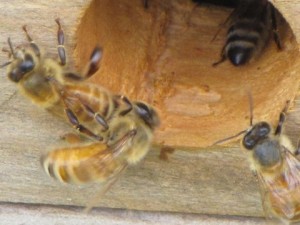Natural, Sustainable Beekeeping in New Zealand
My honey bees Apis mellifera, are precious in more ways than one. . . Some people understand that without our food plants being pollinated, except for the likes of rice and some cereals, we humans will be existing on a very bland diet indeed, others don`t understand at all ! What most don`t understand, is the tiny honey bee, which was imported to our shores in the 1830`s, is the main contributor to this vital job, one which it is finding harder and harder to accomplish. But hey, there have always been enough bees haven`t there ? Once there were, but now there is a huge decline in their numbers due to many issues, I do believe it has been mainly brought on by mans selfishness, his idea that the bee is here for our use and of course, don`t forget, the mighty dollar. Varroa arrived on our shores around 2000, decimating many hives and putting beekeepers out of business. Many hobbyist beekeepers just gave up, not wanting to bother treating their bees twice a year, but our numbers are on the rise again, thanks to many younger and not so young bee enthusiasts learning about bees, planting gardens and orchards, realising they need bees for pollination !
Honey bees have long been part of human life, providing much needed sweetness, light from candle wax, and most importantly, the pollination of over 40% of what we eat. Up until Rev Langstroth discovered removable frames, humans lived with bees in a fair relationship, each providing the other with what they needed ie habitat, flowering plants, honey and wax.
With products from the hive including honey, pollen, wax and propolis earning beekeepers a tidy sum, things changed rapidly, leaving the bees stranded in a place of disease and illness. . their numbers declining, their health declining, with their ability to fight.. slowly declining ..
We will loose our bees unless attitudes change, food as we know it will change considerably, life as we know it will change beyond our comprehension  – sounds abit over the top? I don`t think so, and neither do many other worried bee keepers. I feel very strongly that until many of the established ways of beekeeping, here in NZ and world-wide, change from how much money can be made from keeping bees, to how can we care wisely, working with these insects in a way that will benefit both parties, with the bees being the major beneficiary of our kindness and knowledge we now have regarding the use of pesticides and other chemical nasties.
– sounds abit over the top? I don`t think so, and neither do many other worried bee keepers. I feel very strongly that until many of the established ways of beekeeping, here in NZ and world-wide, change from how much money can be made from keeping bees, to how can we care wisely, working with these insects in a way that will benefit both parties, with the bees being the major beneficiary of our kindness and knowledge we now have regarding the use of pesticides and other chemical nasties.
Your browser may not support display of this image.
Honey bees evolved with Angiosperms, flowering plants, millions of years ago – each supplying the other with the exact life sustaining substance it needs. During this time, bees along with other pollinating insects and birds dealt with many life threatening changes, over time adjusting and continuing to pollinate, plants providing the proteins and sugars needed to keep the insects healthy, the bees transferring pollen from flower to flower, thus continuing the cycle of life . .
So, my plea to all who care for our planet and its inhabitants, next time you see honey bees, bumble bees, other insects in your garden or wild places, think of what you can do to make their short lives free of starvation (plant bee food), free of contamination ( don`t use chemicals of any kind), free of homelessness ( keep a hive, maybe a TopBar hive, in your garden) – it does not take much effort at all . . .trust me
Marcia Meehan
loading...
loading...
Tags: honey bee




Hi Marcia,
Greetings from California! I just read your post and I feel the same way about my bees. There has been a proliferation of new beekeepers here in the San Francisco Bay Area that I feel a hopefulness that we can help save them. I keep hearing this phrase that “the world will be saved at the last possible moment”, so maybe that is what will happen with the bees also.
To the bees!
Best wishes,
Mil
loading...
loading...